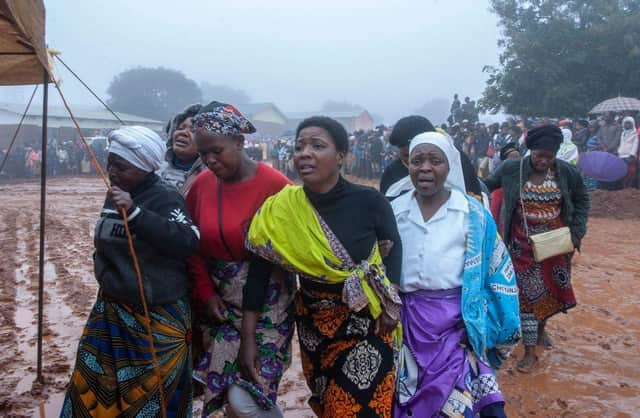Fears of cholera outbreak as Malawi cyclone death toll rises


Andrew Mavala, executive director of HelpAge International partner MANEPO in Malawi, the country hardest hit by the disaster, said vulnerable older people were most at risk from the disaster – citing calls to his charity about elderly people whose neighbours had climbed up trees to avoid flood water, but they were not able to do so.
Many are living in temporary camps set up to house thousands of people who lost their homes in the cyclone.
Advertisement
Hide AdAdvertisement
Hide AdThe government is managing four camps, each housing 500 people and there are huge needs for food and clean water. Blantyre was particularly heavily affected, as Malawi’s second most populous city with many heavily built-up areas.
Mr Mavala said: “Around 500 homes in Blantyre were swept away when water gushed from the mountain at 2am on Sunday night. People were taken by surprise, sleeping in their beds and so many bodies are still buried under the rubble. At least 90 people are officially reported as missing, but there will be so many more.”
He added: “I counted at least 82 older people in one camp I visited and I couldn’t hold back my tears. I spoke to an older man in the camp today and he said ‘Why did the good Lord not take me, as I don’t know how I’m going to recover from this? I’ve lost everything I ever owned’. And these sentiments were repeated over and over. Many older people are caring for orphaned children and they don’t know how they are going to look after them.
“People are in shock. This is much worse than Cyclone Idai. It’s much worse than we ever could have imagined.”
Cholera is a major concern to aid organisations, as levels were already high before the cyclone. Between December 2022 and early March there were in excess of 1,600 deaths from the illness. On Wednesday alone, the Ministry of Health reported 247 new cholera cases and six deaths. Clean water and hygiene measures are needed to combat the spread of the disease.
Mr Mavala said: “The government didn’t have the resources to deal with this and unfortunately international support arrived too late. And now, we’ve been without running water for the past four days and water will become contaminated, so cholera rates will definitely rise. This is a huge concern.”
Cyclone Freddy has affected 10 districts in the country. In some districts whole villages, including their crops, have been swept away.
One older woman in Mulanje called to say that the water had swept away her eight goats which were all she had. She had been given two goats from MANEPO and had worked hard to increase the herd, which she said was now “all for nothing” and she didn’t know how she could survive.
Advertisement
Hide AdAdvertisement
Hide AdMr Mavala said: “The problem is that older people, even though they are often the worst affected are the last to be helped. There’s a feeling that they’ve lived their lives and we must prioritise the young. But they must be helped and treated with dignity.”
Comments
Want to join the conversation? Please or to comment on this article.